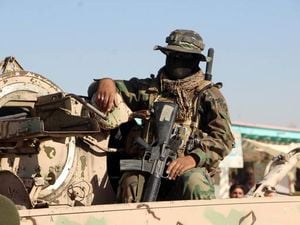A group of 50 sick and wounded Palestinian children began entering Egypt for medical treatment through Gaza's Rafah crossing on Saturday, marking the first opening of this important border post since Israel captured it nearly nine months ago. This development follows months of closure, during which thousands of Palestinians remained stranded, unable to receive necessary medical care.
The reopening of the Rafah crossing is seen as a significant breakthrough, particularly as it supports the ceasefire agreement reached between Israel and Hamas. This agreement was catalyzed by Hamas's release of the last living female hostages held in Gaza, which enabled Israel to approve the crossing's reopening, allowing children to seek medical treatment abroad.
Covering the scene, Egyptian media showed several children being transported on gurneys and quickly moved to ambulances on the Egyptian side. They were immediately rushed to hospitals in the nearby Egyptian city of El-Arish and other locations, reflecting the urgent need for medical attention. One particularly poignant image was of a young girl who had suffered the amputation of her foot, underscoring the dire conditions faced by many children from Gaza.
Zaher al-Wahidi, an official with Gaza's Health Ministry, reported by the Associated Press, noted by Saturday evening, 37 of the children had successfully crossed, accompanied by around 60 family members. He stated, “We urge for medical evacuations to be expedited through all possible routes. Thousands of lives depend on it,” emphasizing the broader humanitarian need.
The Rafah crossing holds special significance as it is Gaza's only passageway to the outside world not entering Israel. It has served as both an escape route and as a channel for humanitarian aid. Over the past 15 months, the Israeli campaign against Hamas, particularly following the militants' attack on southern Israel on October 7, 2023, has devastated Gaza’s healthcare sector, rendering many hospitals non-operational and leaving many without access to life-saving treatments.
Local health officials reported upwards of 110,000 Palestinians had been injured due to the conflict, and they continue to face the challenges posed by the limited operational capacity of the remaining healthcare facilities. Mohammed Zaqout, the director of hospitals with Gaza's Health Ministry, communicated the urgent situation, indicating more than 12,000 patients were currently awaiting treatment, and over 6,000 patients are primed for evacuation. He expressed concern, stating, “The small numbers set to be evacuated will not cover the need, and we hope the number will increase.”
Mai Sammour, the mother of one child patient, Mutasem, shared her hope for her son’s recovery after months of anxiety. She expressed, “He suffers severely, with severe pain and lack of movement; he does not eat well; the disease is very serious.” Her sentiments echo those of many parents with children stuck amid the chaos of conflict, highlighting the desperate need for care unavailable within Gaza.
The reopening of Rafah symbolized not only immediate relief but also the potential for more consistent medical evacuations. The situation has drawn attention to the broader humanitarian crisis shaped by the Israeli-Egyptian blockade over the past 15 years, which has systematically undermined healthcare within Gaza. Before the war, the crossing was frequently used for life-saving treatments not available locally, such as cancer therapies.
Since the conflict reignited, the crossing was closed by Israeli forces early last year following its capture during operations focused on the southern city of Rafah. Egypt also had its side of the border shut down for several months, citing the need to protest against Israel's actions. Yet, with renewed negotiations and international mediation, the crossing was reopened, marking hope for many Clinicians and parents.
Moving forward, Israeli, Egyptian, and Palestinian officials engaged in complex negotiations surrounding control and management of the crossing. While any arrangement is sensitive due to the historical claims by Hamas and the Palestinian Authority (PA) to govern the area, temporary management was placed under the oversight of trained Palestinian personnel barred from displaying PA insignia, ensuring neutrality amid existing situational tensions.
It remains to be seen how the situation evolves, as the second phase of negotiations pertaining to longer-term management of the crossing, alongside discussions about secure routes for humanitarian aid, are set to begin shortly. The hope remains for more sustained access and opportunities for those needing medical help to escape the dire circumstances caused by the conflict.
While the reopening of the Rafah crossing and the evacuation of these children present some relief, it also highlights the broader humanitarian need for continued medical access and consistent efforts to increase the number of evacuations. Ongoing dialogues around the health care crisis within Gaza are more relevant than ever as both local and international observers call for solutions to address the health emergency facing the population.



